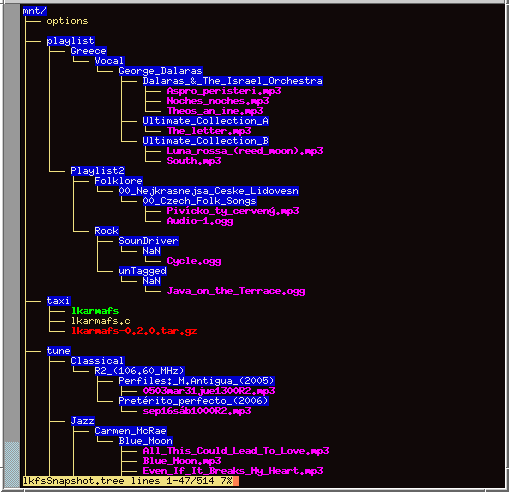What is it?
A GNU-linux user-space filesystem for the Rio Karma (RK) player
based on libkarma
and FUSE.
Libkarma supports the RK
PEARL protocol
over TCPIP (Ethernet). In addition, starting with version 0.0.4,
libkarma also supports the new
mounted-disk (USB-OMFS) interface. Therefore, lkarmafs provides
transparent access to the RK disk contents through both interfaces.
Lkarmafs implements a directory structure based on the RK
file properties, most of which are extracted from the id3 tags
of the tune files. In addition, each tune file is shown
with a suffix determined from its "codec" property (.flac, .mp3,
.ogg, etc.). An example of the default hierarchy is as follows:

Lkarmafs provides most usual filesystem calls, including
statfs(), readdir(), getattr(), open(), read(), write(), unlink()
(delete), etc. In particular, it provides multiple, concurrent
READ/WRITE support. Once the RK is lkarmafs-mounted you can, for
instance, have your PC player (e.g., mp3blaster, xmms or
amarok) play some tunes and, simultaneously, have your
favourite streamer stream (other) tunes through the LAN. And
meanwhile, you can read some text files of the taxi subdir
or copy arbritrary files from the RK to your PC. Moreover, if the RK
is mounted through the Ethernet interface with the non-blocking-write
option (-L), you may keep the RK itself playing other tunes through
the earphones or the RCA lines. By default, write support is
provided only for the taxi directory; but this can be
optionally disabled with the '-T' option, which also adds the fake
directory 'mountDirectory/upload', were tune files can be
copied and they will automatically appear under tune/ with directory
and file names derived fron the tune tags.
Based on FUSE, lkarmafs is mainly intended for
single-user use. Using "chmod", taxi file permissions
can be arbitrarily changed by the owner. Read-only access can be
allowed to other users, under the additional control of standard file
access permissions.
Basic properties of the whole filesystem are provided through
statfs(). Therefore "df" shows the total disk size and
used space. File properties such as size, access permissions, creation
and access times, are shown as regular file attributes. For all the
other properties, extended attributes are used. Therefore, using the
appropriate GNU-Linux tools (e.g., "getfattr", "setfattr") full
access to all the RK metadata associated to each file is granted.
Usage:
- Invocation:
lkarmafs [fuse-mount_opts] [-h] [-H|?]
[-B] [-F] [-G] [-L] [-T] [-U] [-V] [-W] [-X] [-Y]
[-A path|hostname|IP] [-C userCodeset] [-D dummy-name]
[-E tr-string1] tr-string2] [-P passwd] mountDirectory
- Options:
-H : Show the specific lkarmafs options
-h : Show the fuse and generic mount options.
-f : (Non-daemon). Enables showing possible error messages.
-B : Get properties from ??1 files rather than "smalldb" (USB-OMFS interface)
-F : Force files to be written even if they are (different name) duplicates
-G : Disable the "genre" level under "tune" in the filesystem hierarchy
-L : Don't use permanent write-lock (simultaneous read-write may fail)
-T : Allow moving/writing/deleting non-taxi files
-U : Don't update play_last (access time) for tune files
-V : Show currrent version
-W : Don't write "smalldb" upon unmounting (USB-OMFS interface)
-X : Don't use extended attributes (for tune properties such as play_count)
-Y : Directory view of playlists
-A IP|hostname|path : RK interface; default: USB-OMFS/TCPIP auto-discovery
-C userCodeset : your choice of local codeset; default: from locale
-D dummy-name : name for needed missing property values (def. "-UnKnown-")
-E tr-string1 tr-string2 : tr-like pathname editing (man (1) tr)
-P password : password of your RK, if set
- Examples:
See several invocation examples in the included
README file. Here is a very simple one:
lkarmafs -T -Y myKarmaDir
Finds whether the RK is accessible: either USB-OMFS-mounted somewhere or
connected through the Ethernet interface. If it is accessible, mounts
the RK disk on myKarmaDir/. It is mounted daemon-mode and with the
default (FUSE) access permission control.
It is assumed that no Ethernet password has been set and the codeset is
taken from the locale. Any occurrence of the character "/" in property
values needed for path formation (artist, title, etc.) is replaced with
"|" and any occurrence of "|" is shown as "\|". If some path-formation
property value is missing, it is assigned the default dummy name "-UnKnown-".
A special pseudo-file "myKarmaDir/options" is provided to allow changing
some options at run time (i.e., without having to unmount and remount
the filesystem).
Because of -T, the RK disk is mounted with (limited) write permissions
enabled for non-taxi files. A fake directory myKarmaDir/upload/
is provided where tunes can be copied so they will appear under
myKarmaDir/tune/ with path names derived fron the tune tags. The
-T option also enables tune renaming and deleting and other things
such as `cat ~/myMusic/myArtist/myTune.mp3 > myKarmaDir/tune/A/B/C.mp3'.
This sets the genre, artist, source, title and codec properties to
'A', 'B', 'C' and 'mp3', respectively. In this case, the RK will show
this tune with these very same property names, ignoring the tune tags.
The -Y option expands myKarmaDir/playlist/* files, leading to a
directory-structured presentation of playlists.
* To unmount:
fusermount -u myKarmaDir
or
echo End > myKarmaDir/options
Warning!
OMFS unlink() was broken in omfs-0.5.6 and earlier versions.
Use omfs-0.6.1 or later to avoid the risk of possible massive
corruption of the RK disk.
More (up to date) info:
Download the current lkarmafs version and read the included
README and
Changelog files.
|
